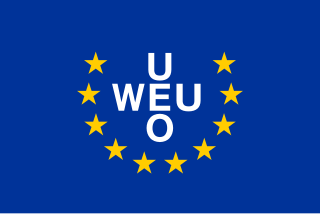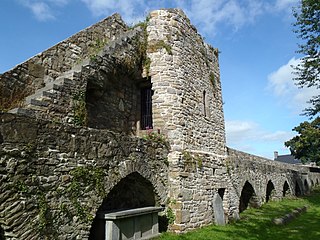Related Research Articles

The Council of Europe is an international organisation with the goal of upholding human rights, democracy and the rule of law in Europe. Founded in 1949, it brings together 46 member states with a population of approximately 675 million as of 2023; it operates with an annual budget of approximately 500 million euros.

The European Council is one of the seven Institutions of the European Union where EU leaders meet to set the political agenda of the union, but they do not pass laws.

The Western European Union was the international organisation and military alliance that succeeded the Western Union (WU) after the 1954 amendment of the 1948 Treaty of Brussels. The WEU implemented the Modified Brussels Treaty. During the Cold War, the Western Bloc included the WEU member-states, plus the United States and Canada, as part of the North Atlantic Treaty Organization (NATO).
The International Council on Monuments and Sites is a professional association that works for the conservation and protection of cultural heritage places around the world. Now headquartered in Charenton-le-Pont, France, ICOMOS was founded in 1965 in Warsaw as a result of the Venice Charter of 1964 and offers advice to UNESCO on World Heritage Sites.

The Common Foreign and Security Policy (CFSP) is the organised, agreed foreign policy of the European Union (EU) for mainly security and defence diplomacy and actions. CFSP deals only with a specific part of the EU's external relations, which domains include mainly Trade and Commercial Policy and other areas such as funding to third countries, etc. Decisions require unanimity among member states in the Council of the European Union, but once agreed, certain aspects can be further decided by qualified majority voting. Foreign policy is chaired and represented by the EU's High Representative, currently Josep Borrell.
European integration is the process of industrial, economic, political, legal, social, and cultural integration of states wholly or partially in Europe, or nearby. European integration has primarily but not exclusively come about through the European Union and its policies.

European Union culture policies aim to address and promote the cultural dimension of European integration through relevant legislation and government funding. These policies support the development of cultural activity, education or research conducted by private companies, NGO's and individual initiatives based in the EU working in the fields of cinema and audiovisual, publishing, music and crafts.

The Heritage Council is an organisation created by the Irish government to "engage, educate and advocate to develop a wider understanding of the vital contribution that our heritage makes to our social, environmental and economic well-being."

The European Museum of the Year Award (EMYA) is presented each year by the European Museum Forum (EMF) under the auspices of the Council of Europe. The EMYA is considered the most important annual award in the European museum sector.

The Entente Florale Europe is an international horticultural competition established to recognise municipalities and villages in Europe for excellence in horticultural displays. Trophies are presented annually by tourist boards and horticultural societies of European countries. There are three categories:
The European Landscape Convention of the Council of Europe, also known as the Florence Convention, is the first international treaty to be exclusively devoted to all aspects of European landscape. It applies to the entire territory of the Parties and covers natural, rural, urban and peri-urban areas. It concerns landscapes that might be considered outstanding as well as everyday or degraded landscapes. The Convention is aimed at: the protection, management and planning of all landscapes and raising awareness of the value of a living landscape.

Europa Nostra is a pan-European Federation for Cultural Heritage, representing citizens' organisations that work on safeguarding Europe's cultural and natural heritage. It is the voice of this movement to relevant international bodies, in particular the European Union, the Council of Europe and UNESCO. It has consultative status with UNESCO and is recognised as an NGO partner.

Pierre Laconte, is a Belgian urbanist. He specialises in urban transport and architectural planning and environmental issues.

Julien Anfruns is a French lawyer and a French business executive. Formerly, he was the Director of Corporate Affairs for Philip Morris, France and a member of the Executive Committee. He also served as a French senior civil servant, and was nominated in September 2013 to serve as a member of the Council of State, “Conseil d’Etat” (France) as a supreme court judge.
European Network Remembrance and Solidarity (ENRS) was created in 2005 as a joint initiative by German, Hungarian, Polish, and Slovak ministers of culture. In 2014 Romania joined the structure.

Interpret Europe – European Association for Heritage Interpretation is an international membership-based association with charitable status that serves all who use first-hand experiences to give natural and cultural heritage a deeper meaning. Interpret Europe encourages dialogue and partnerships between associations and universities, providers and professionals from more than 56 countries.
The European Confederation of Conservator-Restorers' Organisations (E.C.C.O.) is a European non-governmental professional organisation aimed at safeguarding cultural heritage through the use of conservation-restoration techniques.

This article outlines the history of the Common Security and Defence Policy (CSDP) of the European Union (EU), a part of the Common Foreign and Security Policy (CFSP).

European Historic Houses Association is an international organization based in Brussels, Belgium, and registered in the Netherlands. Through consultancy with the European Commission and the European Council, it has oversight over twenty-four national historic houses associations. Its scope includes conservation of historic houses and cultural heritage, including cultural goods.

Dragana Lucija Ratković Aydemir, is a Croatian art historian, museum professional, scholar, and entrepreneur in culture and tourism. She lives and works in Zagreb, Croatia; Istanbul and Çeşme, Turkey.
References
- ↑ Europa Nostra
- ↑ "ENCATC". Archived from the original on 2015-09-24. Retrieved 2012-08-30.
- ↑ "South East European Heritage". Archived from the original on 2014-08-14. Retrieved 2012-08-30.
- ↑ "European Heritage Heads Forum". Archived from the original on 2017-08-10. Retrieved 2012-08-30.
- ↑ European Association of Historic Towns and Regions
- ↑ Informatie Professional
- ↑ "Planning". Archived from the original on 2016-03-03. Retrieved 2012-08-30.
- ↑ NEMO
- ↑ "Lisbon Treaty". Archived from the original on 2018-11-29. Retrieved 2012-08-30.
- ↑ Lisbon Treaty Wikisource
- ↑ "COMMUNICATION FROM THE COMMISSION TO THE EUROPEAN PARLIAMENT, THE COUNCIL, THE EUROPEAN ECONOMIC AND SOCIAL COMMITTEE AND THE COMMITTEE OF THE REGIONS" (PDF). 2014. p. 3, footnote 5. Retrieved 2014-08-14.
- ↑ "Euroclio". Archived from the original on 2012-08-08. Retrieved 2012-08-30.
- ↑ International Union of Architects